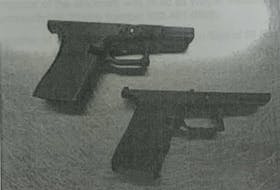
NEW GLASGOW – From Pictou County to the Grand Ol’ Opry, Don Haggart has been playing music since his first guitar was put in his hands at age 13, and he won’t be stopping any time soon.
As a child, Don had one dream: to become a singer/songwriter. He’s never known a time when his mind wasn’t filled with melodies and rhymes, and he was driven from a young age to follow his dreams of becoming a musician.
“I think my first exposure to music was a black guy named Ricky Borden, who used to come to my house, where he boarded his horse,” Don recalled. “He sang the blues. I was only a few years old, and I can still remember it.”
He started his singing career at local coffee houses and was a featured guest on CKEC’s Hattie MacKenzie Show in the mid-1960s. While lead vocalist for The Country Senators, he made his TV debut on Oland’s Saturday Night.
By 1971, he’d decided to join forces with older brother Jim, creating something of an unstoppable force that was poised to take the country music scene by storm in the early 1970s.
Collaborating, they created what Don describes as a unique brand of music that combined personal and spiritual lyrics with a grassroots Maritime style. They believed so strongly in their music that the brothers hitchhiked to Toronto that fall, and within three months, Jim had landed them a recoding contract.
They’d signed with Arpeggio Records, which had a manufacturing and distribution agreement with RCA. A two-sided album released in June 1972, it featured Nashville Girl on one side and I’m Coming Home on the other; and it shot to number one on the charts.
By November 1972, the brothers had been featured on the cover of RPM magazine and fans were packing Toronto’s Horseshoe Tavern to see their performances.
It was a time when it wasn’t easy to be a Canadian entertainer, however. When recording their first album, they were given a four-hour recording slot, along with a half dozen other groups, and were expected to get their songs recorded in just three takes. American performers, however, were treated better, with more recording time and other benefits not available to Canadians.
It was also harder to be a Canadian performer and break into the U.S. – just getting across the border to perform was a challenge unless you had an American recording label backing you.
But thanks to their persistence and determination, the Haggarts were among those who made it – all the way to the stage of the Grand Ol’ Opry.
It was 1972, during Fanfare, a time when 12 busloads of Canadians were planning to head to Nashville for the celebrations. Jim had called the Country Music Association and convinced them that since more than 1,200 Canadians would be in the audience that night, it would be nice if some Canadians performed. The CMA agreed and the Haggart brothers got the green light, becoming the only Canadians to perform that night.
The Haggart brothers had just released their second no. 1 hit album, Pictou County Jail, a song that became their trademark tune over the years.
As the buses travelled to Tennessee, the Haggarts primed the crowd, going from bus to bus, doing small shows on the way down, getting them excited for their performance.
The 1,200 Canadians made up more than one quarter of the audience that night, and when the Haggart brothers hit the stage, they all seemed to jump to their feet and hollered and screamed as if they were Elvis Presley. Not to be outdone, the rest of the crowd jumped up, too.
“That was one of my best memories. We were two guys who didn’t have all that much, and we were playing together, there on the stage of the Grand Ol’ Opry.”
After that performance, the Haggart brothers were welcome back in Nashville any time. They performed several more times at the Grand Ol' Opry. On their second trip they appeared on the cover of the Nashville News.
"I was one of the youngest Canadians to every play the Grand Ol' Opry," Don recalls.
Through it all, however, they stayed true to their roots.
"We often brought Maritime musicians with us as our back-up band, because they allowed us a different flavour than the Grand Ol' Opry musicians," Don said. "A little something different than you'd normally see in Nashville."
Jim and Don recorded three no. 1 hits, and seven others were top 10 hits. They received numerous awards and Juno award nominations in various country categories by the mid-1970s.
The duo also hit the road touring, and had the opportunity to play for some of the major players of the time.
“We played for Pierre Elliott Trudeau once,” Haggart remembers. “They called from the plane, they were running late, and asked us to hold the crowd…until the plane could land and they could drive down from Halifax. Jimmy asked him what he was going to do for Canadian performers.”
By the late 1970s, however, things had changed. Don was tired of what he calls “the business” of being a musician. Only a teenager when he and Jim got their start, Don didn’t enjoy all that came along with releasing a record through a recording label.
"You can get ahead in the music business if you spend a lot of money and associate with the right people," Don said. "I hated that part of the music business."
Labels typically picked the top two releases for the album, he added, and poured all the money and resources into those songs only.
"A lot of artists didn't even want to put all their best songs on a record because the label wouldn't do the best job with them," Don added.
He also had other priorities – he’d met a girl and wanted to settle down.
"I got married and I wanted to buy a house and settle down," Don said. "I'd been on the road since I was 16 years old. I got married and had a family and devoted my time to that."
Even though Don had decided it was time to quit playing with his brother, it didn’t mean he was done with music. He went on to write music for many other artists and eventually became a solo act. Some of his early solo music included the tune A Pictou County Christmas, the title song of the hit 1996 Christmas Daddies CD, which was inspired by his childhood memories.
In 1999, the popular brothers reunited to release an album of new, enhanced versions of their greatest hits, recorded here at home in Pictou County.
They came back together on stage in August 2006, when the duo were inducted in the Nova Scotia Country Music Hall of Fame in Bridgewater. Sadly, Jim passed away a month later, at the age of 68.
Don, however, is still heavily involved in music, most recently releasing Prayers and Promise, an independent gospel CD late last year.
Working with some of the top musicians in Nova Scotia, Haggart created a CD of 10 songs that pay tribute to some of the losses he’s experienced over the years – including the death of his mother when he was a young boy, and his brother Jim three years ago.
"All of these songs were written for specific landmarks of my life. They're songs you can cry, lament and grieve to – and heal to, that's what it was born out of."
But it's not your typical gospel album, he said. It's also a CD you can dance to. The songs are also infused with some home-grown sounds as well, featuring a strong Scottish element.
"Gospel music doesn't have to be sad and sacrificial and gloomy," he explained. "Elvis used gospel beats to create rock and roll. People, at that time, were afraid to really enjoy gospel music. But I can't see anything wrong with dancing to it – there's a line in the Bible that refers to Jesus dancing on the Sabbath day."
Haggart, who was selected by the staff at The News and by local music experts to be inducted in The News’ Virtual Music hall of Fame, says it’s an honour to be included.
“It’s a great thing to be recognized in your own home town,” he said. “It’s a wonderful thing – I feel just humbled by it, especially because it help keeps Jimmy’s memory alive, too.”








